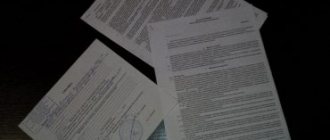VKontakte
Services for conducting real estate transactions and their subsequent registration in the state. authorities are subject to mandatory state duties, the amount of which is established by the legislation of the Russian Federation and is the same for each of the subjects of the Federation. If the state fee is not paid, registration actions will not be carried out.
What does the seller pay?
A person acting as a seller in a purchase and sale transaction of a residential real estate property sends to the body authorized to maintain the Unified State Register of Real Estate a statement that the ownership of this property has transferred to the buyer. This action is not subject to state duty.
If a transaction for the purchase and sale of a residential property needs to be certified by a notary, you will need to pay a state fee in the amount of 0.5% of the transaction amount - no less than 300 rubles and no more than 20 thousand rubles.
To obtain an extract from the Unified State Register of Real Estate about the absence of encumbrances on a residential property, you will have to pay a state fee of 400 rubles. This extract is included in the package of documentation provided to the buyer.
If the seller’s personal data has changed, which includes last name, first name and patronymic, details of an identity document, he will need to make appropriate changes to the Unified State Register of Real Estate. The state fee for making these changes will be 300 rubles.
Who must pay the fee when buying and selling real estate?
The legislative norms of the Russian Federation do not establish which of the parties to the transaction acquires the obligation to pay the state fee, but in the real estate market some traditions have developed in the distribution of costs between the parties .
Salesman
Types of duties paid by the seller:
- There is no fee for carrying out registration actions for the transfer of ownership.
- The fee for obtaining an extract from the Unified State Register of Encumbrances about the absence of encumbrances is 400 rubles.
- The fee for making changes to the USRN database in case of changes in personal information about the seller, including full name and passport data is 300 rubles.
- Also, traditionally, sellers bear all the costs associated with notarizing the transaction. The state duty in this case is 0.5% of the amount specified in the agreement, but it cannot be less than 300 rubles and more than 20 thousand rubles.
Buyer
During the transaction, the buyer will be required to pay for state registration of the transfer of ownership rights to the new owner. The amount of the fee when registering real estate as a property is determined by the Tax Code of the Russian Federation and is 2 thousand rubles.
Important. If the buyers are several citizens, this amount is divided between them in shares proportional to the acquired property rights.
Costs are shared between two
Participants in a transaction for the purchase and sale of real estate have the right to agree on the division of costs for paying state fees.
In this case, for example, the fee for registering the transfer of ownership rights can be divided in half and amount to 1 thousand rubles for each party.
Example
A family of three purchased an apartment on the secondary market. According to the terms of the purchase and sale agreement, each family member is a party to the transaction and owns a share in the purchased property. The shares, according to the DCP, are equal.
To register the right, they must pay a state fee of 2 thousand rubles. However, since there are three buyers, the amount should be divided in accordance with the size of the buyer’s share. In this case, since the acquired shares are equal, each of the owners will have to pay a state fee in the amount of 2000 * 1/3 = 666.67 rubles.
When buying an apartment with a mortgage
Based on the norms of the current legislation of the Russian Federation, the procedure for calculating state duties in a situation where a residential property was purchased using funds raised through mortgage lending differs significantly from the standard one.
The amount of state duties in this case will be:
- for citizens – 1 thousand rubles;
- for enterprises and organizations – 4 thousand rubles.
Once a mortgage loan is fully repaid, all encumbrances are removed from the property purchased using the proceeds of the loan.
Please note! The state duty in this case will be:
- for individuals – 200 rubles;
- for enterprises and organizations – 600 rubles.
Amount of fee for electronic registration of a transaction
The following may carry out electronic registration of a transaction:
- notary;
- developer;
- credit organizations.
In this case, the buyer’s expenses for paying the state duty will be 600 rubles less, since the amount of the state fee for electronic filing of documents will be 1,400 rubles instead of the usual 2,000.
Purchasing real estate is a complex procedure, during which it is necessary to take into account many nuances. One of them is the obligation to pay state duty. Without a document confirming payment, registration actions will not be carried out, and the transaction will not have legal force.
If you find an error, please select a piece of text and press Ctrl+Enter.
Extension of tax during privatization
Absolutely all agreements relating to real estate are recorded in Rosreestr. The need to pay state duty for the purchase and sale of an apartment from 2021 arises in the following cases:
- collecting data from the state register about the absence of transfer or impossibility of conducting transactions;
- drawing up a privatization protocol in Rosreestr;
- introducing changes to the register.
Important! In 2013, the preparation of the privatization protocol was cancelled. Previously, both parties contributed an equal amount to pay the tax. In 2021, from February 1, a tax for registering a purchase and sale agreement will apply.
Accordingly, the state duty is charged not only on the sale, but also on any transactions involving the transfer of rights to real estate: donation, will, etc.
When buying an apartment with a mortgage
The law requires that the mortgage agreement be registered in the Unified State Register of Real Estate. In this way, all transactions are controlled and their safety is ensured so that property is not pledged to several persons at once.
Entry into the register, of course, is accompanied by a fee in accordance with the Tax Code of the Russian Federation.
For individuals, the state duty ranges from 200 to 3,000 rubles. If the ownership of an apartment is registered, the state duty will be 3,000 rubles.
For legal entities, the cost of purchasing an apartment for registering a mortgage agreement will be as much as 28,200 rubles. The most expensive thing for them is registering property in their name, the cost of which is 22,000 rubles.
The amount of state duty when purchasing an apartment and some other payments
In 2021, the state duty when registering ownership of an apartment may vary depending on who pays: a legal entity or an individual.
For the first, they are many times larger, and the region of location also influences. For legal entities, the minimum rate is 33,000 (for the two documents listed below), and for individuals 2,000 rubles (certificate of ownership), plus 1 thousand rubles for registering the purchase and sale agreement.
Buying secondary housing
In this case, the standard state fee is paid. If you re-register a certificate, you must pay a state fee.
Dimensions:
- individuals – 350 rubles;
- legal – 1000 rubles.
The amount of state duty when selling an apartment
The money received as a result of the transaction is subject to personal income tax. The cadastral value is not taken into account by tax and may decrease as a result of receiving a property deduction, the amount of which is 1 million rubles. No matter how the transaction takes place, the state duty is paid in any case. If the declaration indicates the entire amount as income, the tax is calculated as follows: the difference in the sale price and the tax deduction is multiplied by 13%.
From what amount should state duties be calculated?
The state fee for issuing a court order to the magistrate's court is calculated based on the amount of the claims. Depending on the nature of the obligation, the following is used for calculation:
- amount of money collected (for example, principal debt, accrued interest, penalties);
- the value of the property that is claimed by court order (in this case, you need to calculate the market value of a thing, object or object through an appraiser);
- for the totality of all urgent payments, but not more than for 3 years.
There are other options for calculating the amount of recovery, but they are used not in writs, but in claims proceedings.
Let us give a typical example of calculating the amount of collection if we are talking about a debt under a notary receipt. If the principal debt on the receipt is 100,000 rubles, and the accrued interest is 20,000 rubles, then the duty must be calculated on the total amount of 120,000 rubles.
State duty rates according to the Tax Code of the Russian Federation
In Art. 333.19 of the Tax Code of the Russian Federation specifies the state duty rates for filing claims. They are also used when calculating the fee for filing applications for court orders. However, in writ proceedings, a special rule is applied - the fee must be paid in the amount of 50% of the rates that are provided for sending claims to the courts.
The state fee for issuing a court order to collect debt is calculated based on its amount. The table below shows the current court filing fee rates. Therefore, when submitting an application for an order, the amount of state duty received must be reduced by 50% (2 times).
| Debt amount | State duty rate |
| up to 20 thousand rubles. | 4% of the collection amount, but not less than 400 rubles. |
| from 20,001 to 100,000 rub. | 800 + 3% of the collection amount exceeding 20 thousand rubles. |
| from 100,001 to 200,000 rubles. | 3200 + 2% of the amount recovered over RUB 100,000. |
| from 200,001 to 1,000,000 rubles. | 5200 + 1% of the amount recovered over RUB 200,000. |
| from 1,000,000 rub. | 13200 + 0.5% of the collection amount over RUB 1,000,000. (but the total amount of the duty cannot exceed 60 thousand rubles). |
The easiest way is to calculate the court fee if the amount of collection does not exceed 20,000 rubles. For example, when collecting a debt against a notary receipt for a total amount of 15,000 rubles, the calculation formula will be as follows: (15,000 x 4%) / 2 = 300 rubles
.
If a small amount is collected, and the amount of the state duty during the calculation was less than 200 rubles, then you need to pay exactly 200 rubles. This rule is applied by analogy with claims, where the duty cannot be less than 400 rubles.
The state duty rates for issuing a court order through arbitration differ. They are provided for in Article 333.21 of the Tax Code of the Russian Federation. Here is a complete table with rates for calculating claims payments. Upon receipt of an order, it must be reduced by 50%.
| Debt amount | Duty rate |
| up to 100,000 rub. | 4%, but not less than 2,000 rubles. |
| from 100,001 to 200,000 | 4000 +3% of the amount recovered over RUB 100,000. |
| from 200,001 to 1,000,000 rubles. | 7000 + 2% of the amount recovered over RUB 200,000. |
| from 1,000,0001 to 2,000,000 rub. | 23,000 + 1% of the collection amount over RUB 1,000,000. |
| from 2,000,000 rub. | 33,000 + 0.5% of the collection amount over RUB 2,000,000. (but the state duty cannot exceed 200,000 rubles.) |
The calculation algorithm for submitting documents to arbitration does not differ from the rules for justices of the peace. First, the court fee is calculated as for filing a claim, after which the amount received is reduced by 2 times.
How to calculate the duty correctly
The calculation example above is only suitable for small recovery amounts. Most often, the size of the claimants' claims is much higher. Here is another example that will help you understand the calculation rules.
Example 1
.
An application is submitted for the recovery of 250,000 rubles. (200,000 rubles principal debt and 50,000 rubles interest). Formula for calculating the duty: (5,200 + (50,000 * 1%)) / 2 = 2,850 rubles
.
In this case, 5200 rubles. - this is a fixed amount that is paid if the collection amount exceeds RUB 200,000. You also need to calculate 1% of the amount over 200,000 rubles. We divide the result by 2, since an application for a court order is filed.
With a debt amount of 500 thousand rubles. An application for a court order cannot be filed. Such cases are considered through claims proceedings. Accordingly, when calculating the state duty, the result obtained does not need to be divided by 2.
State duty calculator
The easiest way to calculate the duty is through online calculators. Such services can be found on the website of each court. There are also calculators on other reference and information sites on the Internet. To make the calculation, you need to indicate in the online service form the type of request (application for an order) and the total amount of the requirements. After the calculation, you can generate a receipt for payment or go to the Federal Tax Service payment service.
An example of a state duty calculator for a court order in a magistrate's court can be viewed at the link. Since the rates are the same for all regions of Russia, the service can be used to submit applications to any judicial authority
For arbitration courts, an online calculator can be found here.
Who can be exempt from paying state duty
According to Article 333 of the Tax Code of the Russian Federation, this payment may not be made by the following categories:
- state bodies authorities, municipalities, and local self-government;
- individuals who are officially recognized as low-income in accordance with the Housing Code.
All others are obliged to pay state tax.
Rosreestr payment of state duty
Since such payments are made without fail, you need to know the details that will be needed to pay the state duty to Rossreestr. You can find out about them by going to the website rosreestr.ru and selecting the region where the state duty is paid. There you can find all the information about documents for payment. It is important not to forget to indicate your region so that the necessary details are displayed.
Next you will need to select a regional block.
Who pays the court fee
Obviously, the fee must be paid by the person who goes to court with a claim, application or complaint. The claimant in writ proceedings is obliged to:
- fill out an application, confirm the amount of the debt being collected and the grounds for its occurrence;
- independently calculate and pay the fee, or indicate the availability of benefits in the application;
- Submit with your application a document confirming that the state fee has been paid in full.
The applicant also has the opportunity to submit a petition to the judicial authority for a deferment or installment payment of the fee. For example, this may be due to temporary financial problems due to job loss, or a serious illness. The judge may defer payment until the order is made. In this case, the state duty will actually be offset, since it will be collected from the debtor by court order.
Who is exempt from paying duties?
In Art. 333.36 of the Tax Code of the Russian Federation specifies a large list of persons who are generally exempt from paying fees for filing claims and applications for court orders. There is no need to pay state duty when collecting:
- wage arrears, severance pay, other types of payments from the employer;
- alimony.
This benefit is related to the nature of the obligations (debt). The judge will check the nature of the demand based on the content of the application and the attached documents.
The state duty for issuing a court order is paid at the rates specified in the Tax Code of the Russian Federation
For the calculation, the state duty rates provided for filing claims are taken. The resulting calculation result is divided by 2. These are the features of paying the fee for issuing orders. No state duty is paid when collecting alimony and wage arrears.
There are also benefits for certain categories of applicants. Do not pay fees for any types of legal claims:
- disabled people of groups I and II;
- disabled since childhood;
- disabled children;
- Heroes of the USSR and the Russian Federation, full holders of the Order of Glory.
The Tax Code of the Russian Federation also includes a number of other preferential categories of plaintiffs. However, they are exempt from paying the fee only for certain categories of cases for which it is impossible to obtain a court order.
When applying to the arbitration court, disabled people of groups I and II, as well as public organizations of disabled people, are exempt from state fees. However, individuals extremely rarely have grounds to apply to arbitration, especially through writ proceedings.
The availability of a discount on court fees must be indicated in the application. It is also necessary to submit a document confirming the right to benefits, if this does not directly follow from the essence of the requirement. For example, if an application for alimony payments is submitted, the exemption is granted automatically, without additional supporting documents.
Is it possible to underestimate the transaction amount in order to pay less to the notary?
From the calculations above, we can assume that if you underestimate the transaction amount, you will be able to pay less for certifying the contract. For example, buyers and owners agreed on an apartment price of 5.5 million rubles. It turned out that in their case a notarized agreement would be required. Although it turns out that 0.5% * 5.5 million = 27,500, the notary will charge the maximum by law 20,000 rubles for the certificate. In order to reduce the amount of state duty, the parties decided to indicate in the contract the amount of 2 million rubles, and the remaining 3.5 million rubles. do not fix. The certificate will cost not 20,000 rubles, but 10,000 rubles.
In practice, it is not possible to reduce the transaction amount - notaries are usually aware of market prices for real estate and will not certify an agreement with a greatly reduced transaction amount. It’s clear why - they will receive less money for their services. And many sellers do not agree to accept part of the money for an apartment in person.
“How an apartment purchase and sale agreement is certified by a notary - step-by-step instructions”
If the contract is certified at one's own request
(no mandatory notarization provided)
Let me remind you: If all sellers of the apartment are adults and capable, then you can come to the notary only of your own free will, because it is optional - clause 1 of Art. 42 of the Federal Law of July 13, 2015 N 218-FZ.
A) Drawing up an agreement - from 4 to 11 thousand rubles. In each region, the price for compilation differs because it is not determined by law. It is established by the local notary chamber at a general meeting. In addition, the price changes every year. For example, at the time of writing in Moscow - from 8 thousand rubles, in St. Petersburg 6 - 8 thousand rubles. Can I bring my own purchase and sale agreement and not have to pay for drawing it up?
B) Notarization (certification) of the agreement - % of the transaction amount. The transaction amount is the price of the apartment that the parties (owners and buyers) agreed upon among themselves. It will be indicated in the purchase and sale agreement. The percentage depends on the amount of the transaction and whether the sellers (owners) and buyers are close relatives of each other. Tariffs are taken from clause 1 of Art. 22.1 Basics about notaries.
When buyers and sellers are close relatives of each other, that is, when an apartment is sold to a spouse, parent(s), son/daughter, grandson/granddaughter, or grandparent.
— If the transaction amount is up to 10 million rubles, then certification of the contract costs 3,000 rubles. + (0.2% * transaction amount). — If the transaction amount is more than 10 million rubles, then 23,000 rubles. + (0.1% * (transaction amount - 10 million)). But the final cost of the certificate should not exceed 50 tr. SHOW EXAMPLES ↓ Example No. 1: Alexander and Svetlana have an apartment in Moscow. Each has 1/2. They decided to sell the apartment to their son Dmitry, i.e. to a close relative. Although not necessary, they decided to contact a notary. Sale price - 7 million rubles. The notary charged them 8,000 rubles for drawing up the agreement, and 3,000 rubles for certifying it. + (0.2% * 7 million) = 17,000 rub. Only 25,000 rub.
Example No. 2. Oksana has an apartment in St. Petersburg. She decided to sell it to her grandchildren Ivan and Olga, i.e. close relatives. We agreed on the price of the apartment - 11 million rubles. They turned to a notary, even though he was not necessary in their case. They paid 6,000 rubles for drawing up the contract. For his ID - 23,000 rubles. + (0.1% *(11 million - 10 million)) = 24,000 rub. Only 30,000 rub. When buyers and sellers are strangers to each other, other relatives - If the transaction amount is up to 1 million rubles, then certification of the contract costs 3000 rubles. + (0.4% * transaction amount). — If the transaction amount is over 1 to 10 million rubles, then 7000 rubles. + (0.2% * (transaction amount - 1 million)). — If the transaction amount is more than 10 million rubles, then 25,000 rubles. + (0.1% * (transaction amount - 10 million)). But in this case, the maximum cost of the certificate is 100 rubles. SHOW EXAMPLES ↓ Example No. 1: Alexander, Andrey and Svetlana have an apartment in Moscow. Each has 1/3. They decided to sell the apartment to their nephew Artem for 4.5 million rubles. A nephew is not considered a close relative. Although not necessary, they decided to contact a notary. The notary charged them 8,000 rubles for drawing up the contract, and 7,000 rubles for certifying it. + (0.2% * (4.5 million - 1 million) = 14,000 rubles. Total 22,000 rubles.
Example No. 2. The spouses Oksana and Vasily have an apartment in St. Petersburg, which is registered as joint ownership. They decided to sell it. We put up an ad and found buyers - the spouses Oleg and Marin, i.e. not relatives at all. We agreed on a price of 12 million rubles. They turned to a notary, even though he was not necessary in their case. They paid 6,000 rubles for drawing up the contract. For his ID - 25,000 rubles. + (0.1% *(12 million - 10 million)) = 27,000 rub. Only 33,000 rub.
Example No. 3. Vladimir has a small apartment in Samara. He decided to sell it and found buyers - Andrey and Svetlana. They are unfamiliar to him, i.e. not relatives. Sale price - 950 tr. They turned to a notary, even though he was not necessary in their case. They paid 4,000 rubles for drawing up the contract. For his ID - 3,000 rubles. + (0.4% * 980 t.) = 6,800 rub. Only 10,800 rub.
C) Submitting a purchase and sale agreement for registration is free. The notary must submit the notary agreement for registration with the rest of the documents HIMSELF AND FOR FREE. Now this is included in the basic service of certifying a gift transaction - Art. 1 of the Federal Law of 03.08.2018 N 338-FZ and clause 1 of Art. 22.1 Basics about notaries.
The notary only needs to pay money for the state fee, which he will pay for registering the transaction - 2000 rubles (clause 22, clause 1, article 333.33 of the Tax Code of the Russian Federation). If a notary submits documents electronically, Rosreestr has set a discount of 30% - you only need to pay 1,400 rubles. According to the law, the state duty is paid by buyers, because they are beneficiaries, but in practice the notary doesn’t care who gives the money.
After the transaction is registered in Rosreestr, the buyers will become the new owners of the apartment. The documents can be collected from the notary. Some notaries notify you about this by phone, while others will have to call you yourself.
Do I need to pay a state fee for issuing a court order?
Almost all types of legal proceedings require a fee. Rates and general calculation rules are described in the Tax Code of the Russian Federation. Also in this code you can find a list of preferential categories of citizens who are fully or partially exempt from paying state fees.
A few words about the rules of writ proceedings, which may affect the calculation of the duty:
- an order can be obtained only for monetary (property) claims and obligations that are indisputable in nature
- all such obligations are listed in the Code of Civil Procedure of the Russian Federation and the Arbitration Procedure Code of the Russian Federation, and they must be taken into account by the claimant when applying to a judicial authority; - writ proceedings are allowed in magistrates' courts and in arbitration
- judicial bodies of general jurisdiction consider only claims and complaints, including after the order of magistrates is canceled; - since orders are issued in a simplified manner and without a full trial of the case, it is no less easy to cancel them
- but after the cancellation of the court order, the claimant retains the right to file a claim, and he can offset the previously paid state duty; - when an order is issued, the amount of the paid fee will be collected from the debtor
- in the opposite situation, if the issuance of a court order is refused, the applicant will lose money.
In writ proceedings, you can collect debts on loans and borrowings, under receipts and agreements, and for housing and communal services. The orders also require alimony as a percentage of the debtor’s income. There is a limitation regarding debt - through the magistrate's court you can get an order for debts if their size does not exceed 500 thousand rubles. If the amount owed is greater, you need to file a claim.
The calculation of the payment when submitting an application directly depends on the amount of collection. It is calculated by the claimant independently when submitting documents to the judicial authority. If you incorrectly calculate the state fee or fail to pay it, the judge will refuse to consider it. But for some types of cases and categories of claimants there are preferential standards for paying state fees. Read more about this below.
Can I bring my purchase and sale agreement to the notary?
By law, buyers and sellers can do this, but in practice everything is different - most notaries do not accept sales contracts “from outside”. Agreements are usually drawn up by notary assistants using pre-prepared templates, and notaries themselves are not eager to check “other people’s” agreements before certifying them. Therefore, you will have to pay for drawing up the contract.
If you want to find a notary who accepts contracts “from the outside,” then check this by phone. I had such a case. I called one notary, and as usual, an assistant answered the phone. He told me that they accept contracts. I drew up a purchase and sale agreement for my clients, we came to the notary and he refused to accept it. As usual, they referred to the fact that the contract would be drawn up by assistants; they were experienced specialists and they knew better. Therefore, ask this point over the phone several times.
Distribution and reimbursement of legal expenses
In certain cases that arise during the consideration of a filed claim, when legal costs had to be incurred, they can be divided between the parties or recovered from the plaintiff or defendant.
1. The court, upon a written application, is obliged to recover the money spent on a lawyer or attorney involved in the case in a reasonable amount from the losing party.
2. If the plaintiff refuses his claims, then court costs and state fees are not refunded. The exception is when the defendant satisfied the demands after filing the claim.
3. If the plaintiff and defendant come to an amicable agreement, then they have the right to indicate in it the procedure for distributing the costs incurred. Otherwise, the court may subsequently recover them according to the general rule.
4. If the court decision does not fully satisfy the demands of the plaintiff or defendant, then the costs are distributed in proportion to the satisfied demands.
Difficulties in collecting costs incurred
The expenses incurred above are not the only ones; others may arise during the consideration of the case. How to collect them, what evidence to attach to the application and how to justify it from a legal point of view are questions well known to any qualified lawyer.
In most cases, citizens or organizations faced with a legal problem do not turn to a lawyer, wanting to save money. Such a decision may be fraught with the fact that the court will accept the position of the opposing party, which will participate with a representative who can qualitatively and competently substantiate his arguments. Therefore, contacting a specialist is the first step towards a positive resolution of the case. It is important in this regard that the costs of a lawyer, as well as other costs, in most cases will be reimbursed by the opposing party (subject to winning the case).
Amount of state duty for individuals
Below we present the amounts of state duty for individuals for the most common transactions.
State registration of rights:
- carried out at the request of the copyright holder for real estate objects - 2000 rubles;
- termination of the right without transfer of the right to a new copyright holder - 2000 rubles;
- shares in the right of common ownership, for common property in an apartment building for all categories of payers - 200 rubles;
- common joint property - 2000 rubles;
- agreements for participation in shared construction, divided by the number of parties to the agreement - 350 rubles;
- rights to lifelong inheritable ownership of a land plot – 2000 rubles;
- ownership of a land plot intended for personal subsidiary or dacha farming, vegetable gardening, horticulture, individual garage or housing construction - 350 rubles;
- for a real estate object being created or created on the land plot specified in the previous paragraph (house, garage, etc.) - 350 rubles;
mortgages, including entry into the Unified State Register of Real Estate (USRN) – 1000 rubles;
Making changes to the USRN records in connection with an agreement to amend or terminate a mortgage agreement – 200 rubles.
You will find a detailed table with the amount of state fees for registration actions in the appendix to this article.
Today, documents can be accepted either in person to a division of the rights registration authority (Rosreestr, Cadastral Chamber) or through a multifunctional center (regardless of the location of the property).
The list of divisions of the rights registration authority and multifunctional centers is published on the official website of Rosreestr.
Go to the official website, select “Individuals” – “Methods of obtaining services” – “In the offices of Rosreestr and the Cadastral Chamber”.
Next, follow the link “Offices and reception areas. Make an appointment in advance.”
Residents of the capital can use the website mos.ru, which lists government centers.
When buying an apartment in a new building
If a citizen (or business entity) decides to buy an apartment in a high-rise building under construction, then the parties sign an equity participation agreement (EPA). The procedure for its state registration will cost 350 rubles for an individual, and 6 thousand rubles for economic entities.
If the participants of the DDU intend to make adjustments to the terms of the agreement, their registration will be required. It will cost 350 rubles.
Document preparation costs
The fact of selling an apartment is secured by a purchase and sale agreement, but before concluding it you need to collect a package of documents. When applying for some of them, you will need to pay:
- Extract from the Unified State Register of Real Estate about the property . The home seller receives and pays for it. To obtain an extract, you need to contact the MFC or the Cadastral Chamber.
- A certificate stating that the person selling the home is not registered with a psychoneurological dispensary is required for the purity of the transaction and the absence of the possibility of challenging it. The cost varies from 1 to 4 thousand rubles and the buyer pays for it.
- Archival extract from home book . To obtain the document, you should go to the housing office or the management company that maintains the house. The buyer pays for an extract, the cost of which is from 1 to 6 thousand rubles, and it is required to check the presence of other tenants who could later challenge the transaction.
When concluding a purchase and sale agreement, you can use the services of a notary or lawyer, but this clause is not mandatory, so you can complete the transaction yourself.
If one of the parties requires the participation of a specialist, then you will have to use services that will incur some financial expenses.
Home assessment before the transaction - who pays, how much?
Not everyone knows who exactly should pay for a home appraisal before selling - the seller or the buyer. The appraisal of the property is not the responsibility of the seller , so the buyer pays for the work of a home appraiser. The cost of such a service varies between 5,000-10,000 rubles.
State duty for registration of purchase and sale of an apartment
Obligations to transfer the state fee for registering an apartment purchase and sale agreement are imposed on all parties to the transaction:
- The amount of tax when issuing an extract or certificate of ownership is 2 thousand and 22 thousand rubles. for residents of the Russian Federation and economic entities, respectively.
- If the subject of the agreement is a share in an apartment, then the participant will need to pay a tax of 350 rubles.
- If the selling party does not need to make adjustments to the Unified State Register, then the fee for the sale of an apartment will be 350 rubles.
- If the parties to the agreement decide to terminate the agreement on the transfer of ownership of the real estate, then the secondary entry of information will cost 200 for residents of the Russian Federation and 600 rubles. for enterprises.
In fact, the participant in the transaction does not pay for the certificate of ownership, but for the recording of adjustments in the Unified State Register of Real Estate. In this case, residents of the country will have to pay 350 rubles, enterprises - 1 thousand rubles.
Rosreestr, payment of duties
Almost all legally significant transactions relating to property are carried out through Rosreestr:
- purchase and sale agreement;
- registration of preschool education;
- imposing restrictions on the subject of property under a loan agreement, and so on.
To receive these services, participants must pay a state fee at the time of purchasing an apartment.
Moreover, if the real estate is the common property of a husband and wife, then the obligation to make payment is imposed on one of them.
Both cash and electronic money can be used to transfer state fees. You can make a payment in the following ways:
- Through banking institutions - you must have a passport and a receipt for payment with you. This method can only be used by one of the parties to the contract.
- Using bank terminals, you can transfer money from a card or use cash.
- At Russian Post offices you can pay for the required service using a receipt. But it is worth considering that a commission fee will be charged for transferring money.
- Through Internet banking, the user can transfer the required amount and print a receipt. If necessary, you can get a stamp at the nearest bank branch.
- Owners of electronic wallets can use the functionality of the web resource used to make payments.
Expert opinion
Mironova Anna Sergeevna
Generalist lawyer. Specializes in family issues, civil, criminal and housing law
You can obtain details for transferring money on the department’s website. The user will need to go to the site and indicate the subject of residence, after which the required information can be requested.
What does the law say?
- Chapter 25.3 of the Tax Code of the Russian Federation provides a list of payers from whom state duty may be charged, the procedure and timing for its payment, as well as features and benefits.
- Article 333.33 of the Tax Code of the Russian Federation determines the amount of state duty for registration actions.
- Federal Law No. 218 of July 13, 2015 “On State Registration of Real Estate” determines the grounds for collecting and the procedure for returning the fee.
The amount of state duty when buying or selling an apartment
The amount of money collected for the provision of public services is clearly stipulated in the Tax Code of the Russian Federation. The specific amount of the fee will depend on the type of legally significant actions performed and some additional factors.
Registration of housing with a mortgage
If housing is purchased with a mortgage, the Tax Code also provides for taxation. You will have to pay 1,000 / 4,000 if the buyer is an individual or legal entity, respectively. The basis for collecting a fee is the transfer of the mortgage agreement to Rosreestr.
If changes are required to an already registered agreement, the amount will be 2,000. Termination of the agreement will also require payment of a state fee - 200/600 rubles. for individuals/organizations.
Purchasing a share in an apartment
If there are several buyers (the housing is purchased as shared ownership), then each of them takes on their share of the expenses - the amount of the fee is divided by the number of participants (it does not matter what share of the residential property will belong to each). The amounts of payments to the state budget remain the same - 2,000 for individuals and 22,000 rubles. - for legal entities. Example. Provided that the participants in shared ownership are individuals, they will pay 1,000 when registering real estate for two, 666.67 for three, 500 rubles each. - for four.
Duty rates
Any registration actions relating to real estate objects are carried out by Rosreestr; accordingly, this organization is the final recipient of the state duty.
When purchasing on the primary market from a developer
Important. When making real estate transactions on the primary market, an equity participation agreement must be drawn up.
For such a transaction, a state duty is charged in the amount of:
- 350 rubles for individuals.
- In the amount of 6 thousand rubles for legal entities.
If, after registering the DDU, you need to add any additional information to it, you will have to pay 350 rubles to register the changes.
For a mortgage
The fee charged for registering transactions involving borrowed funds differs from standard payments. Fee established:
- In the amount of 1 thousand rubles for individuals.
- In the amount of 4 thousand rubles for organizations.
An additional fee when purchasing an apartment with a mortgage is the fee for removing the encumbrance after paying off the debt to the bank.
Rates:
- For citizens – 200 rubles.
- For organizations – 600 rubles.
When purchased on the secondary market
If the apartment was purchased on the secondary market, a tax fee will be collected from the participants in the transaction in the amount of:
- 350 rubles for individuals.
- 1 thousand rubles for legal entities.
When registering an agreement
Any transactions for the purchase and sale of real estate must undergo state registration. Until this procedure is completed, the agreement has no legal force. Registration services are provided by Rosreestr on a reimbursable basis:
- 2 thousand rubles for individuals.
- 22 thousand rubles – if the parties to the transaction are legal entities. faces.
Note: The buyer is responsible for paying the registration fee.
Who pays the state fee?
The state duty is paid when performing actions of a legal nature, as well as when issuing supporting documents by authorized bodies. The seller pays a separate receipt for entering the agreement into the registers. The buyer, in addition to this payment, also assumes a registration fee for the application for transfer of ownership of the apartment.
Where can I get the receipt form?
On the official website of Rosreestr you can find all the necessary information regarding payment of state duty. If a legal representative is paying for the services, you will need to issue a power of attorney in his name to represent interests.
A receipt serves as confirmation of payment. In accordance with No. 210-FZ dated July 27, 2010, the applicant is not required to provide it to the authorities - thanks to the state information system, information about the payment made is available to civil servants. However, it is better to keep the receipt - upon presentation, the documents will be immediately accepted for processing, and the date on the payment receipt will be considered the day the application for registration was received.
If payment information is missing or the applicant has not paid the full amount, registration will not be carried out. This is primarily relevant for cases when documents are transferred to the registration authority before payment (this possibility exists) - if confirmation of the money transfer is not received within 10 days , the papers will be returned.
The receipt (form No. PD-4) can be downloaded on the website of the Federal Tax Service or Rosreestr, or obtained directly from the tax office, the Sberbank cash desk or the MFC. If the contract is drawn up by a notary, he will provide a receipt for payment. It is important to be careful when filling it out - errors made when rewriting the details will lead to the payment not being received by the addressee.
Where to pay?
You can pay:
- at the cash desk of the nearest bank (if they accept such payments, you can check by phone);
- through an ATM;
- on the government services portal;
- using electronic payment systems or terminals.
In case of overpayment, to receive the difference, you will have to submit an application, attaching a payment document (for a partial refund, a copy is sufficient, for a full refund, the original is required). The entire amount is returned if the payer paid but did not submit an application to Rosreestr. The validity period of the receipt is not limited by law (the payment document is considered unlimited).
Filling out a receipt
Receipts for non-cash payments can only be used by individuals. If the fee is paid by a legal entity, a payment order must be issued.
A receipt for payment of the fee can be filled out by hand at a bank branch. To do this, you will need to enter the details of the government agency to which the documents will be submitted. Also, the payment document can be filled out electronically, or generated automatically on the website of the State Services or Rosreestr.
Below you will see a sample receipt for registering an apartment’s contract of ownership:
State Services Portal
In order to pay the state fee through the State Services portal you must:
- Log in to the website and enter the citizen’s personal account (the button is in the upper right corner of the page).
- In the list of notifications, find information about the application accepted by Rosreestr and the invoice issued for payment.
- Click the “Pay” button.
- Choose a convenient payment method.
- Enter details and information about the payer.
- Wait for the confirmation code in the SMS message and enter it in the form that appears.
If the application was not submitted through the State Services website, you must receive a receipt for payment.
Further:
- Go to the portal page.
- Enter your login and password.
- Select the “Payment” section.
- Click the “Payment by receipt” button.
- In the window that appears, enter the unique accrual identifier that appears on the screen (UIN).
- Click the “Pay” button.
Sources
- https://law-divorce.ru/gosposhlina-pri-pokupke-prodazhe-kvartiry/
- https://potreb-prava.com/nedvizhimoe-imushhestvo/zhilaya-nedvizhimost/gosposhlina-pri-pokupke-kvartiry-kto-oplachivaet-prodavec-ili-pokupatel.html
- https://brosalin.ru/gosposhlina-za-dogovor-kupli-prodazhi-kvartiry/
- https://zakondoma.ru/sdelki/gosposhlina-pri-pokupke-kvartiry-razmer-kto-platit.html
- https://prozhivem.com/kvartira/prodazha/tarif-notariusov-na-dogovor-kupli-prodazhi
- https://rosreesstr.ru/gosudarstvennaya-poshlina-pri-registratsii-nedvizhimosti
- https://ZKHinfo.ru/kvartira/gosposhlina-pri-pokupke
- https://zhivem.pro/kvartira/prodazha/poryadok-prodazha/rashody-prodavca-i-pokupatelya.html
- https://expravo.com/zhilishhnoe-pravo/kvartira/kuplya-prodazha-kvartiry/dokumenty/gosposhlina.html
- https://ros-nasledstvo.ru/gosposhlina-pri-pokupke-prodazhe-kvartiry/
Where and how to deposit the amount?
- Through the bank. In this case, you will need a receipt issued by a government agency, which will indicate the details of the payee and information about the payer. Payment can be made both through the transaction window and through bank self-service devices.
- In Russian post offices. In this case, a completed receipt will also be required.
- Through the Federal Tax Service website. To do this, you need to select the “Payment of state duty” section, select the desired category and enter the required data.
- Through the State Services portal.
- Sberbank Online.








